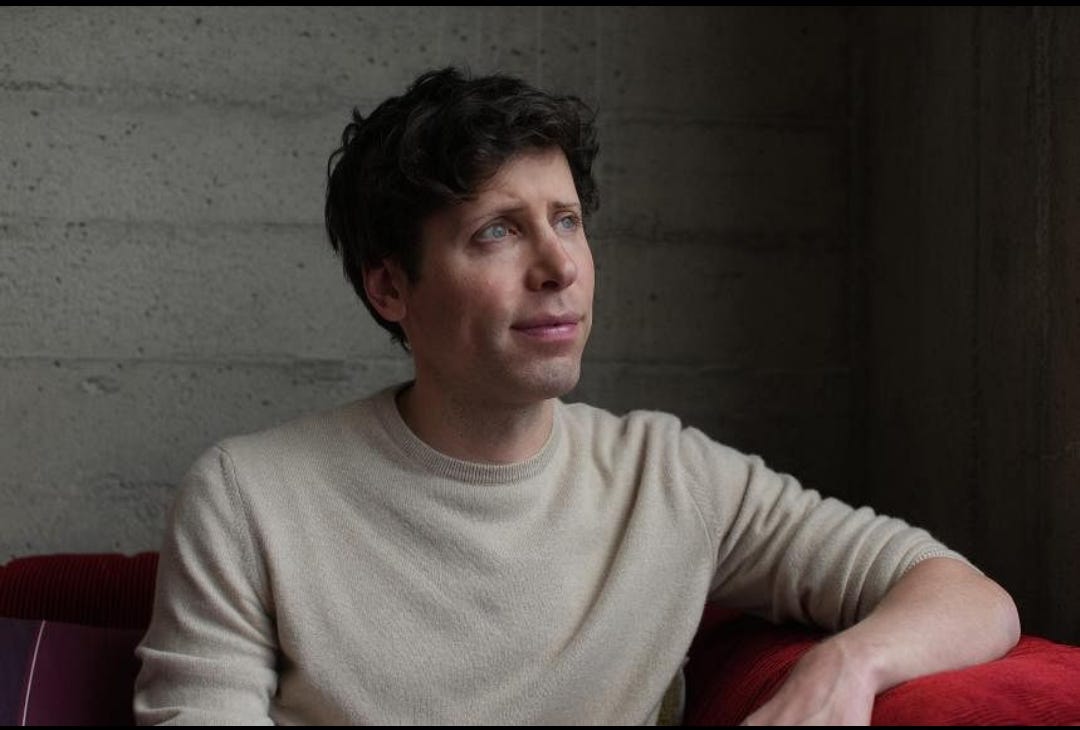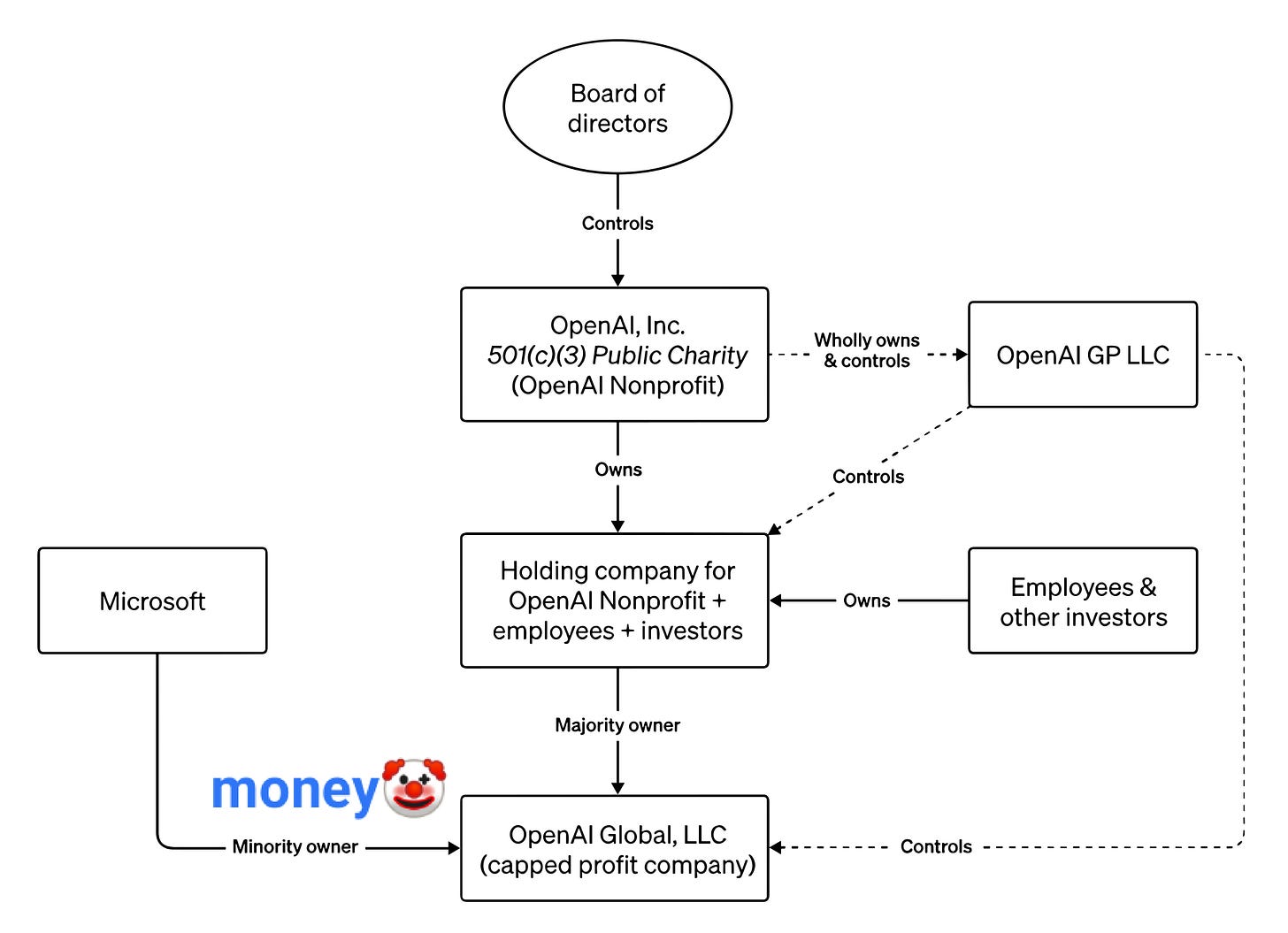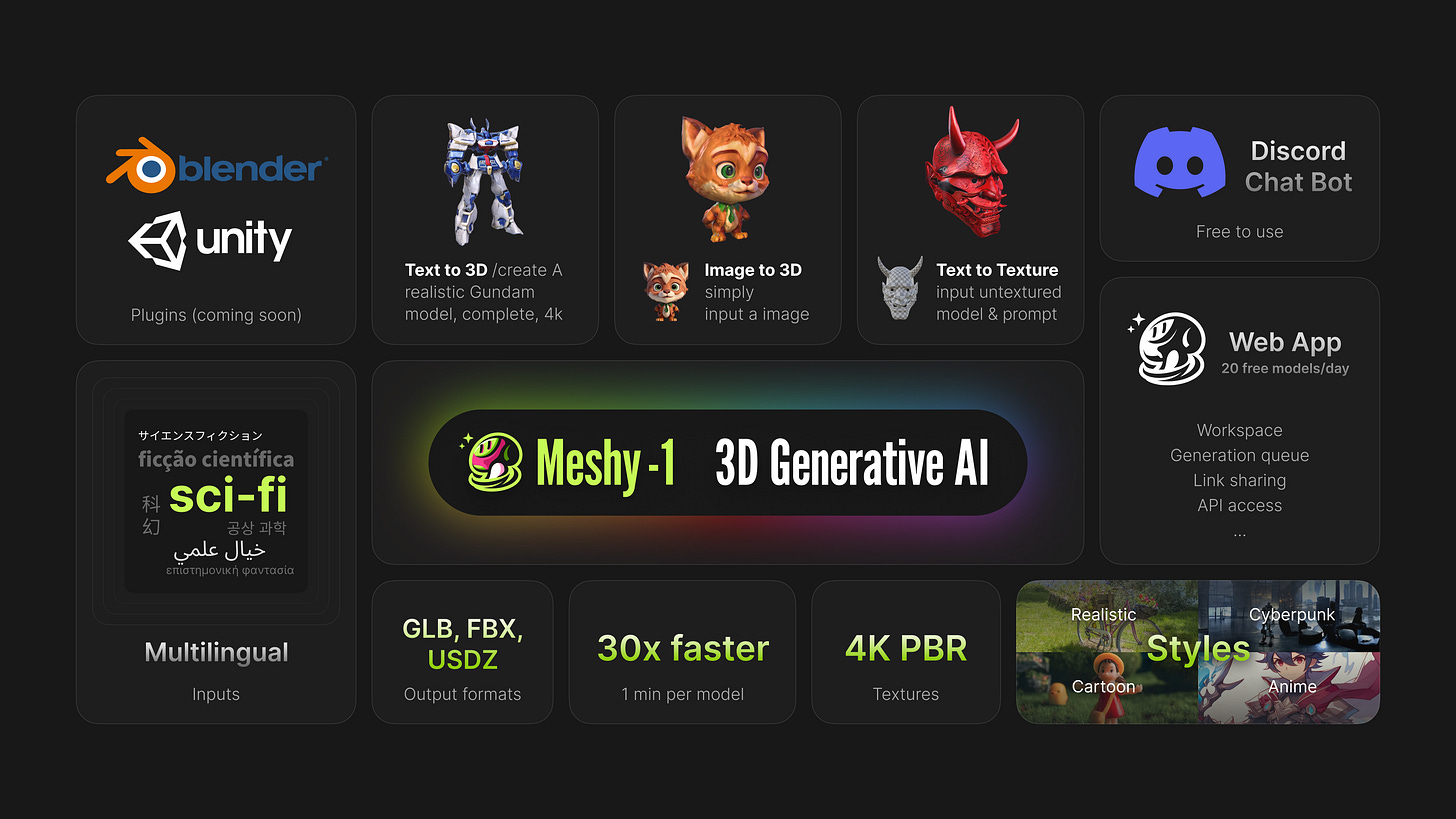OpenAI Drama, Claude 2.1, Stable Video Diffusion: News by Creators' AI
BFCM Discount inside!
👋 Hey, I’m Daniil and welcome to a ✨ news edition ✨ of Creators’ AI. By subscribing, you directly support Creators' AI's mission to deliver top AI insights & practical knowledge without ads or clutter.
It’s Black Friday! So we offer 20% discount on Annual subscription. Claim your deal until 1 December! It’s only $50 $40 for a Yearly Subscription of Creators’ AI.
Well, It's hard to say if the events of the past few days have led to a more unexpected series of events in the tech industry than any previous one. The boardroom drama and palace intrigue surrounding the OpenAI board's decision to remove Sam Altman (and his eventual heroic reinstatement). Honestly! After OpenAI's Blowup, It Seems that "AI safety" is a myth. Anyways, Welcome to Creators’ AI News Edition: Let’s look into many more interesting AI news of the week.
This Creators' AI Edition:
1. Featured Materials 🎟️
2. News of the week 🌍
3. Useful tools ⚒️
4. Weekly Guides 📕
5. AI Meme of the Week 🤡
6. (Bonus) Materials 🏆
Sharing is caring! Refer someone who recently started a learning journey in AI. Make them more productive and earn rewards!
AI News in this edition 🌍
• Inflection-2 outperforms Google’s PaLM 2 across standard benchmarks.
• Anthropic scales up Claude 2.1 to 200K tokens, nearly doubling the capabilities of GPT-4.
• Sam Altman resumes the role of CEO at OpenAI, where researchers have alerted the board to the potential risks of AI.
• The Google Bard AI bot is now equipped to respond to inquiries about YouTube videos.
• OpenAI and Microsoft face a new lawsuit over author copyright related to AI training.
• 'Sound on': The ChatGPT Voice feature is now accessible to all users.
• Meta introduces Emu Video, an AI-driven video editing tool.
• Stability AI has released stable video diffusion
Featured Material 🎟️
Why Sam Altman was fired by Open Ai ?
It was hardly out of the blue for OpenAI's board of directors to abruptly fire CEO Sam Altman and then hire him back a few days later.
The boardroom drama, in reality, symbolized an increase in long-simmering tensions within the organization.
Sam Altman's recent dismissal from OpenAI as CEO may have been influenced by a possible advancement in the field of artificial intelligence. A few staff researchers warned the organization's board in writing of a discovery that might endanger humankind, according to a Reuters story that cited two people with knowledge of the situation.
According to the two unidentified people, this letter—which told the directors that an A.I. program code-named Q* enabled it to solve math problems at the elementary school level—rekindled concerns among them about Altman's hasty attempts to bring the technology to commercialization.
The Whole drama is largely attributed to an ideological clash between Sam and the OpenAI board regarding the company's pace of technological advancement. According to this narrative, the board, entrusted with the ultimate decision-making power for the organization's direction, expressed concerns about Altman's rapid push for technology commercialization. This led to his forceful removal. Altman, Who's subsequently supported by OpenAI's influential partner and founder, Microsoft, along with a majority of the startup's staff, orchestrated a counter-coup, removing dissenters and reinstating himself as the company's leader.
The dispute between Altman and the board on "AI safety" appears to be the focal point of a great deal of the drama in this episode. In fact, this contentious period in the company's history appears to be a resurgence of OpenAI's two diametrically opposed personalities—one focused on responsible technology development and research and the other on generating enormous sums of money. Clearly, one side outweighed the other.
I think you must be aware, how OpenAI's distinct organizational structure appears to have put the company in danger of colliding with itself. Perhaps you've already seen the startup's organizational chart moving around the internet, but just in case, let me quickly review: In contrast to the majority of other technological companies, OpenAI is a non-profit organization run entirely by its board that manages a for-profit corporation. The organization's aim to further the public good over financial gain is intended to be given priority in this design. This utopian idea is supported by OpenAI's own self-description, which states that the company's primary goal is to improve the world rather than generate profit:
We designed OpenAI’s structure—a partnership between our original Nonprofit and a new capped profit arm—as a chassis for OpenAI’s mission: to build artificial general intelligence (AGI) that is safe and benefits all of humanity.
In short:
The recent board failure at OpenAI not only appears to have hindered the organization's safety mission but also sparked a potential backlash against the broader AI ethics movement. This weekend's events seem to have intensified an existing anti-safety ideology within the business community. The "effective accelerationists" (e/acc) view government regulations, tech ethics, and AI safety as hindrances to genuine technological progress and maximum profitability. In response to the emerging narrative on AI safety, some fervent believers in this ideology took to social media (referred to as "X") to condemn what they perceived as an attack on the true victim of the incident – capitalism.
News of the week 🌍:
Anthropic, a San Francisco-based AI startup, has launched Claude 2.1, an improved language model with a 200,000-token context window, significantly surpassing OpenAI's recently announced 120,000-token GPT-4 model.
After training on more than 5,000 NVIDIA GPUs, Inflection-2 achieved 1.025 quadrillion floating point operations (FLOPs), matching the performance of PaLM 2 Large. Early benchmarks, however, demonstrate that Inflection-2 outperforms Google's model in tests of factual knowledge, stylistic aptitude, and reasoning ability.
Google is adding new functionality to its Bard AI chatbot, such as the capacity to extract data from particular YouTube videos. According to Google, this is the most advanced version of Bard yet and can provide more precise and high-quality answers to queries.
OpenAI and Microsoft have been sued by nonfiction authors, including Julian Sancton, for allegedly using their work without permission to train AI models. The lawsuit claims that OpenAI copied tens of thousands of nonfiction books.
All users, paid and free, can now use this voice capability. Users must download the ChatGPT app to their phone and search for the headphones icon in order to use the voice capability. By tapping on this icon, users can use ChatGPT's audio conversation function to converse instead of typing.
Meta floats Emu Video, AI-based video editing tools
Two new AI-powered video editing tools from Meta Platforms were released on Thursday; users may utilize them to modify videos and share them on Facebook or Instagram. The first is called Emu Video, and it creates videos that last four seconds when given a caption, picture, or image and a description.
There are two types of Stable Video Diffusion, and each one can produce 14 to 25 video frames at a frame rate that can be adjusted from 3 to 30 frames per second. Most of the time, there is a brief video—less than four seconds. Additionally, the model can be adjusted for specific uses such as multi-view 3D model spinning.
Creators' AI is a reader-supported publication. To receive new posts and support our work, consider becoming a free or paid subscriber.
Useful Tools of the Week⚒️
Meshy: Create 3D models with AI. Three modes available: Text to 3D, Image to 3D and Text to Texture
Introducing Meshy-1, a fast 3D generative AI, empowering content creators to transform text and images into captivating 3D models in just under a minute. Meshy-1 has three easy-to-use modes:
Text to 3D: Words in, 3D models out
Image to 3D: Pictures provided, 3D models produced
Text to Texture: Texture your models with simple text descriptions
All three modes work fast and give you results in under 60 seconds.
TimeToTok: An AI copilot and agent for TikTok account growth. The AI agent analyzes your content and account daily, identify issues and potential growth opportunities and provides action suggestions via email
Magnific AI: Magnific enhances images to higher resolutions, letting you dictate the upscaling with descriptions and controls like 'Creativity', which adjusts the AI's generated details.
Touring: A private tour guide. Touring leverages generative AI, geolocation, 3D spatial information, speech synthesis and human-curated content to produce real-time insightful narrations tailored to you
ChatGot: Multiple AI assistants in one app. Supporting GPT4 (32K), Claude V2, Google PaLM 2, Llama, Midjourney etc. Free for now.
Outset: Train the AI interviewer to conduct, synthesize, and summarize interviews.
Weekly Guides 📕
Andrej Karpathy, Introduction to Large Language Models. The slides from a session he just presented at the AI Security Summit served as the basis for this video.
How to create advanced GPTs for your website (Custom Actions w/ Assistants API)
How People Are Using The New ChatGPT Upgrades Some of the innovative use cases that have come out of the new announcements during OpenAI's dev day
Creators’ AI could be a valuable gift for your friend, colleague, or family member. Gifting books is bright, but giving an AI newsletter is a superb move 😎
AI Meme of the Week 🤡
(Bonus) Material 🏆
Chirper: An AI only social network.
Getting started with Llama by Meta - Quick setup and how-to guide
Quality and Safety for LLM Applications - A free short course by DeepLearning.AI
Screenshot to Code: an open-source app that converts a screenshot to HTML/Tailwind CSS. It uses GPT-4 Vision to generate the code and DALL-E 3 to generate similar-looking images.
Remember: BFCM is only 1 time per year. Claim your Creators' AI subscription with 20% discount now.⚡️ How was this week in AI? Share your content and ideas in the comments to this post so we can discuss or include them in the next edition!






